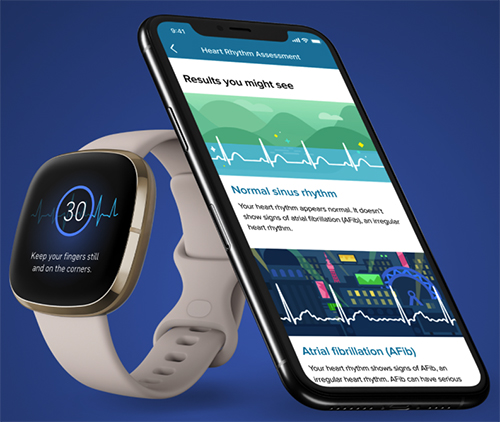Many companies want to adapt consumer wearables to monitor health conditions, including biomarkers tested by medical laboratories
Clinical laboratory managers know that wearable devices for monitoring biophysical functions or measuring biomarkers are becoming more complex and capable thanks to advances in miniaturization, informatics, software, and artificial intelligence machine learning that enable new functions to be developed and proved to be accurate.
In September, Fitbit (NYSE:FIT), took that a step further. The San Francisco-based maker of personal fitness technology, “received 510(k) clearance from the US Food and Drug Administration (FDA), as well as Conformité Européenne (CE marking) in the European Union, for its electrocardiogram (ECG) app to assess heart rhythm for atrial fibrillation (AFib),” according to a press release.
The fact that Google is currently in the process of acquiring Fitbit for $2.1 billion may indicate that wearable devices to help physicians and patients diagnose and monitor health conditions will be big business in the future.

Helping Doctors ‘Stay Better Connected’ to Their Patients
“Helping people understand and manage their heart health has always been a priority for Fitbit, and our new ECG app is designed for those users who want to assess themselves in the moment and review the reading later with their doctor,” said Eric Friedman, Fitbit co-founder and Chief Technology Officer, in the press release.
Prior to submitting the device for approval to regulatory agencies, Fitbit conducted the clinical trial in regions throughout the US to evaluate the device’s ability to accurately detect AFib from normal sinus rhythm and generate ECG traces. The researchers proved that their algorithm was able to detect 98.7% of AFib cases (sensitivity) and was able to accurately identify normal sinus rhythms (specificity) in 100% of the cases.
Venkatesh Raman, MD, interventional cardiologist and Medical Director of the Cardiac Catheterization Lab at 609-bed MedStar Georgetown University Hospital, was Principal Investigator for the clinical study on Fitbit’s ECG app. “Physicians are often flying blind as to the day-to-day lives of our patients in between office visits. I’ve long believed in the potential for wearable devices to help us stay better connected, and use real-world, individual data to deliver more informed, personalized care,” he said in the press release.
“Given the toll that AFib continues to take on individuals and families around the world,” Raman continued, “I’m very enthusiastic about the potential of this tool to help people detect possible AFib—a clinically important rhythm abnormality—even after they leave the physician’s office.”
Fitbit ECG App Receives European CE Marking
In addition to receiving approval for the Fitbit ECG app in the US, the device also received CE marking (Conformité Européenne) for use in some European countries.
In October 2020, the app was made available to Fitbit Sense users in the US, Austria, Belgium, Czech Republic, France, Germany, Ireland, Italy, Luxembourg, the Netherlands, Poland, Portugal, Romania, Spain, Sweden, Switzerland, and the United Kingdom. The device also received approval for use in Hong Kong and India.
It is estimated that more than 33.5 million people globally have AFib, an irregular heart rhythm (arrhythmia) that can lead to stroke, blood clots, or heart failure. The American Heart Association estimates that at least 2.7 million Americans currently live with the condition. The most common symptoms experienced by those with the condition are:
- Irregular heartbeat,
- Heart palpitations (rapid, fluttering, quivering or pounding),
- Lightheadedness,
- Extreme fatigue,
- Shortness of breath, and
- Chest pain.
Risk factors for AFib include advancing age, high blood pressure, obesity, diabetes, European ancestry, hyperthyroidism, chronic kidney disease, alcohol use, smoking, and known heart issues such as heart failure, ischemic heart disease, and enlargement of the chambers on the left side of the heart.
According to the Centers for Disease Control and Prevention (CDC), there are more than 454,000 hospitalizations annually in the US that list AFib as the primary diagnosis. In 2018, AFib was mentioned on 175,326 death certificates with the condition being the underlying cause of death in 25,845 of those cases.
The CDC reports that cases are increasing and projects that by 2030 12.1 million people in the US will have AFib. Many people are asymptomatic of the illness and do not know they have it, which can make AFib more difficult to diagnose.
“Early detection of AFib is critical, and I’m incredibly excited that we are making these innovations accessible to people around the world to help them improve their heart health, prevent more serious conditions, and potentially save lives,” Friedman said, in a statement.
Clinical laboratory managers should monitor these developments closely. Fitbit’s FDA clearance and CE Marking of its ECG app suggest this trend is accelerating.
—JP Schlingman
Related Information:
Fitbit’s ECG App Gets FDA Nod to Track Heart Rhythm Irregularities
Fitbit’s Sense Smartwatch Gets FDA Clearance for EKG App
What the Apple Watch’s FDA Clearance Actually Means
FDA Confirms Samsung’s Galaxy Watch 3 is Cleared for EKG, Just Like the Apple Watch




